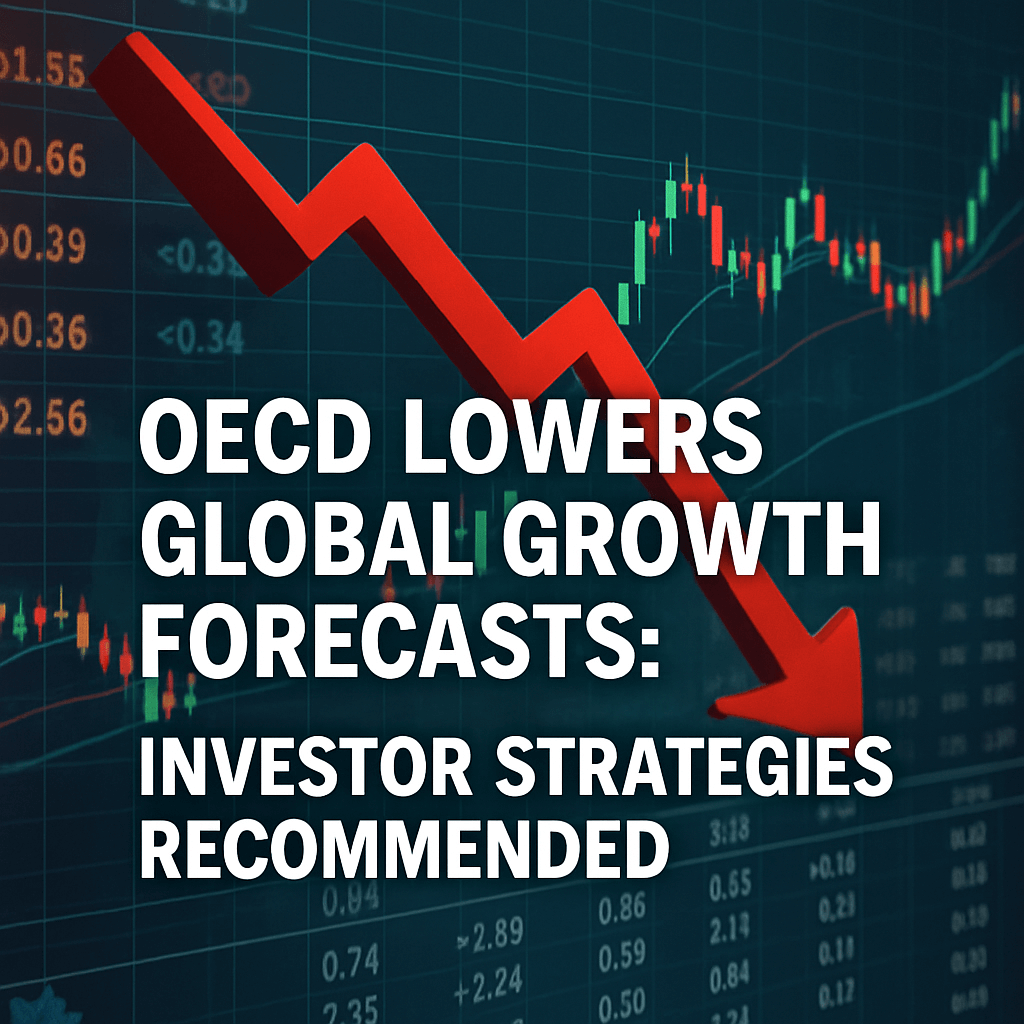OECD Lowers Global Growth Forecasts: Investor Strategies Recommended

The Organization for Economic Co-operation and Development (OECD) has issued a notable reduction in its global growth forecasts, echoing concerns over the economic repercussions stemming from recent tariff impositions. Following announcements made by President Donald Trump regarding these tariffs, Nigel Green, CEO of the deVere Group, has urged investors to undertake immediate actions to realign their portfolios with the evolving economic landscape.
OECD’s Forecast Cuts
In its comprehensive economic outlook, published on a recent Tuesday, the OECD anticipates global growth rates to fall to 2.9% for both 2025 and 2026—marking the lowest projections observed since the shockwaves of the 2020 pandemic. This downgrade has reverberated through nearly all G20 economies, highlighting the pervasive discord across the international economic framework.
“Weakened economic prospects will be felt around the world, with almost no exception,” stated the OECD.
Implications of the U.S. Tariffs
The forecast for the United States reflects a dramatic decline, with growth projected to dip from 2.8% in 2024 to approximately 1.6% in 2025 and a further reduction to 1.5% in 2026. The primary catalyst for this deceleration has been attributed to the series of tariffs announced by Trump in April, which have escalated the average effective tariff rate in the U.S. to over 15%, significantly up from 2.5%. This level of tariff implementation is unprecedented in recent history, being the highest since the 1940s.
“These tariffs are directly affecting business decisions,” notes Nigel Green. “Companies are halting investment, adjusting pricing, and shifting production. These are measurable actions, not projections.” As supporting evidence, recent trade data corroborate these assertions, revealing substantial declines in both imports and exports.
Inflation and Interest Rate Dynamics
Compounding the challenges presented by tariffs is their inflationary impact, which has led to expectations that the Federal Reserve will be unable to implement further interest rate cuts in light of stagnant growth. Markets had initially priced in potential easing of fiscal conditions, but these anticipations are being reassessed as cost pressures remain persistent.
“Investors who have been waiting for rate cuts are now facing a different backdrop,” says Green.
Global Economic Repercussions
Beyond the U.S., the OECD has also lowered growth estimates across various key economies, including China, India, France, Japan, South Africa, and the United Kingdom. This broad-based economic slowdown is evidenced by weakened trade volumes, deteriorating investment flows, and diminishing business confidence across both advanced and emerging markets.
Green elaborates, saying, “This is a broad-based loss of momentum. The effects of the tariffs are moving through the global system. The shift is visible across regions and sectors, and portfolios must reflect that shift.” In this context, the deVere Group recommends that clients reevaluate their exposure to assets that are heavily contingent upon global trade volumes and historically low borrowing costs.
Strategic Portfolio Adjustments
In light of these forecasts, deVere is prioritizing allocations towards resilience-oriented sectors. These include infrastructure investments, inflation-linked assets, and sectors that are more insulated from cross-border disruptions. Green emphasizes, “We are focusing on resilience and consistency. That includes select real asset strategies, stronger regional balance sheets, and businesses with pricing power that is not tied to external demand.”
The Role of Policy in Stabilizing Markets
While the OECD advocates for the easing of trade restrictions to restore healthy investment flows, it acknowledges that no immediate resolution is forthcoming. Tariffs appear to have become an integral element of U.S. economic strategy, and market participants should brace for a protracted period of elevated tariffs across various sectors.
“This is not something investors can ignore,” warns Nigel Green. “Unprecedented trade policies are shaping supply chains, global investment flows, and inflation expectations. This is not just a headline risk; it’s already embedded in the numbers.”
Reassessing Investment Strategies
As the OECD’s latest forecast delineates a more complex environment for capital allocation, investors are urged to reevaluate their exposures proactively. Green discusses the potential outcomes, asserting that, “Those who make adjustments now are more likely to protect value and find opportunities that others miss.” Waiting for market confirmation can increase the likelihood of being caught off-balance in a rapidly changing economic context.
Ultimately, this scenario encourages a paradigm shift in investment philosophy, whereby reliance on historical patterns or assumptions of a return to prior conditions is no longer viable. The global growth model is adjusting, and those who adapt swiftly may find themselves at a strategic advantage.
Source: diyinvestor